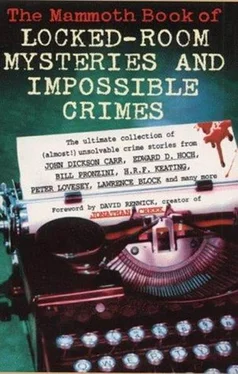Mike Ashley - The Mammoth Book of Locked-Room Mysteries And Impossible Crimes
Здесь есть возможность читать онлайн «Mike Ashley - The Mammoth Book of Locked-Room Mysteries And Impossible Crimes» весь текст электронной книги совершенно бесплатно (целиком полную версию без сокращений). В некоторых случаях можно слушать аудио, скачать через торрент в формате fb2 и присутствует краткое содержание. Жанр: Детектив, на английском языке. Описание произведения, (предисловие) а так же отзывы посетителей доступны на портале библиотеки ЛибКат.
- Название:The Mammoth Book of Locked-Room Mysteries And Impossible Crimes
- Автор:
- Жанр:
- Год:неизвестен
- ISBN:нет данных
- Рейтинг книги:3 / 5. Голосов: 1
-
Избранное:Добавить в избранное
- Отзывы:
-
Ваша оценка:
- 60
- 1
- 2
- 3
- 4
- 5
The Mammoth Book of Locked-Room Mysteries And Impossible Crimes: краткое содержание, описание и аннотация
Предлагаем к чтению аннотацию, описание, краткое содержание или предисловие (зависит от того, что написал сам автор книги «The Mammoth Book of Locked-Room Mysteries And Impossible Crimes»). Если вы не нашли необходимую информацию о книге — напишите в комментариях, мы постараемся отыскать её.
A new anthology of twenty-nine short stories features an array of baffling locked-room mysteries by Michael Collins, Bill Pronzini, Susanna Gregory, H. R. F. Keating, Peter Lovesey, Kate Ellis, and Lawrence Block, among others.
The Mammoth Book of Locked-Room Mysteries And Impossible Crimes — читать онлайн бесплатно полную книгу (весь текст) целиком
Ниже представлен текст книги, разбитый по страницам. Система сохранения места последней прочитанной страницы, позволяет с удобством читать онлайн бесплатно книгу «The Mammoth Book of Locked-Room Mysteries And Impossible Crimes», без необходимости каждый раз заново искать на чём Вы остановились. Поставьте закладку, и сможете в любой момент перейти на страницу, на которой закончили чтение.
Интервал:
Закладка:
“When Morley was in the dining-hall or one of the sitting-rooms – which ever place we planned to have something happen – I would be in the locked office, and at a signal which he would give me when most of the servants were out of the room waiting to bring in a new course, I would turn on the spray. He always kept at the very farthest end of the room, behind the screen, and put his face to an open window there. Then, when everybody in the room was under the influence, which they were in a minute or two, he would take whatever he wanted from some unconscious man or woman, or even several persons, before anyone woke up. We’ve had no one to help us except an assistant of the cook, whom I bribed to make it as long between courses as possible. When I was ready to have the servants go in with the next dish I would touch a little electric bell in the office which Morley had arranged to communicate with the kitchen. The cook’s assistant knows nothing, though, except that for some reason it was convenient to me not to have the meals hurried, and to be able to regulate exactly the moment when the different courses should go in.
“Of course, the horrid stuff has affected our health – Morley’s and mine – as well as that of everybody else, who has been near when the machine was worked, or lived in the house for any length of time. But we hoped that Sidney and her mother would soon give up. Then the place would be Morley’s, and we would be repaid for everything. While if they held on we should at least have the jewels.
“When Morley was working at the walls he discovered the way into this secret place out of our office – not the only ‘hidie hole’ in the house – but neither Sidney nor her mother knows of its existence. We thought it would be useful to get things out of the way, for fear of detectives searching our boxes, and so it has been. Morley has always sent me up, because I am so light and small and don’t make as much noise on the creaking stairs as a man would. Now you know the whole story. And if you have any sense of justice you’ll admit that Morley isn’t to blame, when the place should have been his, and not Sidney’s or her mother’s.”
Long before dawn Mr and Mrs Morley Chester left Wood House. Next day Christopher told Sidney and Sir Walter Raven the tale as it had been told to him. Also, he mentioned the coal. Also, he showed them the store of jewels and bank-notes.
Where the Morley Chesters went Christopher and others did not know, and did not want to know; but when an advertisement was put into all the most important papers that the mysterious thief at Wood House had been discovered, and that everybody who had lost anything could have it returned by claiming it, the enlightened police were unable to get upon the track of the missing ones.
Christopher would not accept any payment from Sidney Chester. But he would like to have a piece of her wedding-cake to “dream on.” He did not think that it would cause him to dream of old oak.
THE MOTOR BOAT by Jacques Futrelle
One of the many tragedies linked with the sinking of the Titanic was the death of author Jacques Futrelle (1875-1912). Futrelle was the creator of Professor S.F.X. Van Dusen, better known as “ The Thinking Machine ” because of his remarkable grasp of logic and deduction in solving apparently impossible crimes. Van Dusen came to prominence in one of the best known of all locked-room mysteries , “ The Problem of Cell 13 ”, serialised in The Boston American in 1905. Dusen claimed that he could escape from a locked cell in the strongest prison kept under constant watch. The story was run as a contest to see if anyone could come up with the solution. The way in which Futrelle achieves his escape is perhaps the most ingenious in all fiction. I have not selected that story here, partly because it is almost constantly in print in some book or another, but mostly because it is not a crime story, but an extremely clever challenge. After this story Dusen is consulted, usually by newspaper reporter Hutchinson Hatch, on all manner of bizarre and seemingly impossible crimes. The following story, which first appeared in the Sunday Magazine ( 9 September 1906 ) is much less well known, though it is wonderfully bizarre.
Captain Hank Barber, master mariner, gripped the bow-rail of the Liddy Ann and peered off through the semi-fog of the early morning at a dark streak slashing along through the grey-green waters. It was a motor boat of long, graceful lines; and a single figure, that of a man, sat upright at her helm staring uncompromisingly ahead. She nosed through a roller, staggered a little, righted herself and sped on as a sheet of spray swept over her. The helmsman sat motionless, heedless of the stinging splash of wind-driven water in his face.
“She sure is a-goin’ some,” remarked Captain Hank, reflectively. “By Ginger! If she keeps it up into Boston Harbor, she won’t stop this side o’ the Public Gardens.”
Captain Hank watched the boat curiously until she was swallowed up, lost in the mist, then turned to his own affairs. He was a couple of miles out of Boston Harbor, going in; it was six o’clock of a grey morning. A few minutes after the disappearance of the motor boat Captain Hank’s attention was attracted by the hoarse shriek of a whistle two hundred yards away. He dimly traced through the mist the gigantic lines of a great vessel – it seemed to be a ship of war.
It was only a few minutes after Captain Hank lost sight of the motor boat that she was again sighted, this time as she flashed into Boston Harbor at full speed. She fled past, almost under the prow of a pilot boat, going out, and was hailed. At the mess table later the pilot’s man on watch made a remark about her.
“Goin’! Well, wasn’t she though! Never saw one thing pass so close to another in my life without scrubbin’ the paint offen it. She was so close up I could spit in her, and when I spoke the feller didn’t even look up – just kept a-goin’. I told him a few things that was good for his soul.”
Inside Boston Harbor the motor boat performed a miracle. Pursuing a course which was singularly erratic and at a speed more than dangerous she reeled on through the surge of the sea regardless alike of fog, the proximity of other vessels and the heavy wash from larger craft. Here she narrowly missed a tug; there she skimmed by a slow-moving tramp and a warning shout was raised; a fisherman swore at her as only a fisherman can. And finally when she passed into a clear space, seemingly headed for a dock at top speed, she was the most unanimously damned craft that ever came into Boston Harbor.
“Guess that’s a through boat,” remarked an aged salt, facetiously as he gazed at her from a dock. “If that durned fool don’t take some o’the speed offen her she’ll go through all right – wharf an’ all.”
Still the man in the boat made no motion; the whizz of her motor, plainly heard in a sudden silence, was undiminished. Suddenly the tumult of warning was renewed. Only a chance would prevent a smash. Then Big John Dawson appeared on the string piece of the dock. Big John had a voice that was noted from Newfoundland to Norfolk for its depth and width, and possessed objurgatory powers which were at once the awe and admiration of the fishing fleet.
“You ijit!” he bellowed at the impassive helmsman. “Shut off that power an’ throw yer helium.”
There was no response; the boat came on directly toward the dock where Big John and his fellows were gathered. The fishermen and loungers saw that a crash was coming and scattered from the string piece.
“The durned fool,” said Big John, resignedly.
Читать дальшеИнтервал:
Закладка:
Похожие книги на «The Mammoth Book of Locked-Room Mysteries And Impossible Crimes»
Представляем Вашему вниманию похожие книги на «The Mammoth Book of Locked-Room Mysteries And Impossible Crimes» списком для выбора. Мы отобрали схожую по названию и смыслу литературу в надежде предоставить читателям больше вариантов отыскать новые, интересные, ещё непрочитанные произведения.
Обсуждение, отзывы о книге «The Mammoth Book of Locked-Room Mysteries And Impossible Crimes» и просто собственные мнения читателей. Оставьте ваши комментарии, напишите, что Вы думаете о произведении, его смысле или главных героях. Укажите что конкретно понравилось, а что нет, и почему Вы так считаете.










